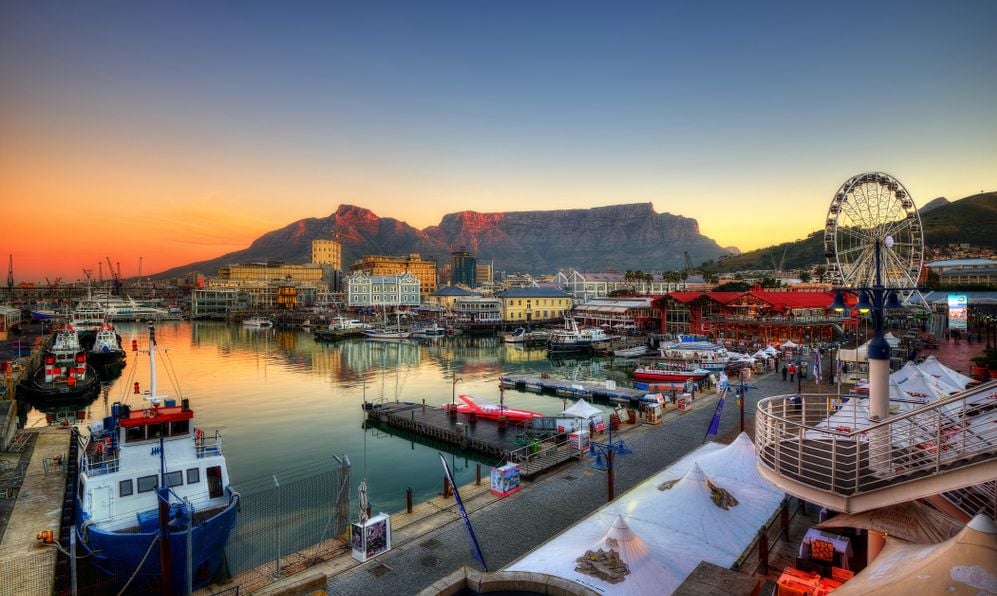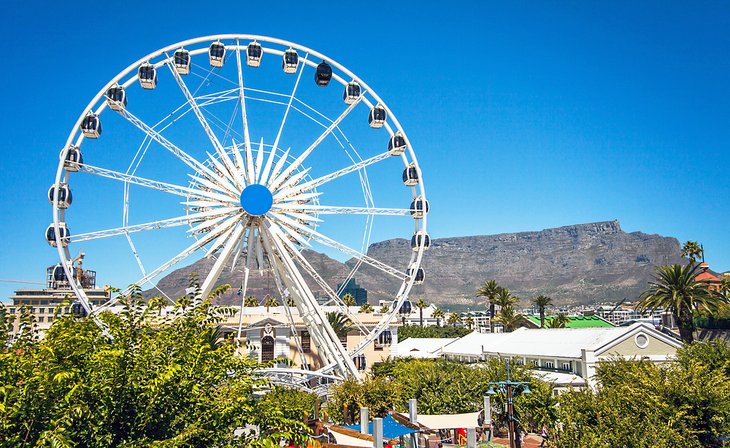
Cape Town, a city nestled at the foot of the iconic Table Mountain, is a dazzling tapestry of natural beauty, rich history, and vibrant culture. It’s a place where the Atlantic and Indian Oceans collide, where penguins waddle on pristine beaches, and where the echoes of a turbulent past resonate in its cobblestone streets. From exhilarating hikes to poignant historical sites, Cape Town offers an unforgettable experience for every traveller. This comprehensive guide will navigate you through the best the Mother City has to offer, equipping you with everything you need to plan your perfect Cape Town adventure.
A Glimpse into the Past: Cape Town’s Rich History
Cape Town’s story is a complex and often difficult one. Its history is inextricably linked to colonialism, slavery, and apartheid, but it’s also a story of resilience, cultural fusion, and ultimately, hope.
Related Articles about Cape Town: Where Mountains Meet the Sea – A Comprehensive Guide:
- Amsterdam: Where Canals Whisper Histories and Luxury Hotels Bloom
- A Traveler’s Guide to Hanoi: A City Steeped in History and Charm
- Bangkok: The City of Angels, A Timeless Tapestry of Wonders
- Seychelles: An Archipelago of Unforgettable Allure
- Laos: A Journey Through the Land of a Million Elephants and Tranquil Temples
-
Early Inhabitants: Long before European arrival, the Khoisan people inhabited the Cape Peninsula for thousands of years, living off the land and developing unique cultures.
-
The Arrival of the Dutch (1652): The Dutch East India Company established a refreshment station at the Cape in 1652, led by Jan van Riebeeck. This marked the beginning of European settlement and had a profound impact on the indigenous population.
-
The Slave Trade: The Dutch brought enslaved people from across Africa and Asia to the Cape, creating a system that shaped the social and economic fabric of the region. Their descendants, the Cape Coloured community, represent a significant part of Cape Town’s diverse population.
-
British Colonial Rule: The British took control of the Cape in the late 18th century, leading to further conflict with the Dutch settlers (Boers). The discovery of diamonds and gold in the interior further intensified British influence.
-
Apartheid (1948-1994): The National Party implemented apartheid, a system of racial segregation and discrimination that had devastating consequences for non-white South Africans. Cape Town, with its diverse population, was a focal point of resistance.
-
The End of Apartheid and the New South Africa: Nelson Mandela’s release from prison in 1990 and the subsequent democratic elections in 1994 marked the end of apartheid and the beginning of a new era for South Africa. Cape Town continues to grapple with the legacy of its past, striving for reconciliation and equality.
Must-See Attractions: A Tapestry of Experiences
Cape Town boasts a remarkable array of attractions that cater to diverse interests. From natural wonders to historical landmarks, here are some of the must-see places:
-
Table Mountain: The iconic flat-topped mountain is the undisputed symbol of Cape Town. Take a cable car to the summit for breathtaking panoramic views of the city, the coastline, and the surrounding mountains. For the adventurous, hiking trails offer a more challenging and rewarding ascent.
-
Robben Island: A UNESCO World Heritage Site, Robben Island served as a prison for political prisoners during apartheid, including Nelson Mandela. A guided tour provides a poignant and unforgettable glimpse into the struggle against apartheid and the resilience of the human spirit.
-
Kirstenbosch National Botanical Garden: Nestled at the foot of Table Mountain, Kirstenbosch is a world-renowned botanical garden showcasing the incredible diversity of South African flora. Stroll along the Boomslang Canopy Walkway for stunning views and a unique perspective.
-
Cape Point and the Cape of Good Hope: Located at the southwestern tip of the Cape Peninsula, Cape Point offers dramatic scenery, rugged cliffs, and the iconic Cape of Good Hope. Explore the lighthouses, hike the trails, and keep an eye out for wildlife.
-
Boulders Beach: Home to a colony of African penguins, Boulders Beach is a delightful place to observe these charming creatures in their natural habitat. Swimming is allowed in designated areas.
-
V&A Waterfront: A vibrant hub of activity, the V&A Waterfront offers a wide range of shops, restaurants, museums, and entertainment options. Take a boat trip, visit the Two Oceans Aquarium, or simply soak up the atmosphere.
-
Bo-Kaap: This historically significant neighbourhood is famous for its brightly coloured houses and cobblestone streets. Bo-Kaap is home to a vibrant Cape Malay community, and exploring its streets is a journey through history and culture.
-
District Six Museum: This museum tells the story of the forced removals of residents from District Six during apartheid. It’s a powerful and moving testament to the human cost of segregation.
-
Lion’s Head: A popular hiking destination, Lion’s Head offers stunning 360-degree views of Cape Town. The hike is relatively short but can be challenging in places, especially near the summit.
-
Chapman’s Peak Drive: This scenic coastal road winds its way along the mountainside, offering breathtaking views of the Atlantic Ocean. It’s a must-do for any road trip in Cape Town.
-
Beaches: Cape Town boasts a stunning coastline with beaches to suit every taste. Camps Bay and Clifton offer glamour and excellent swimming conditions, while Muizenberg is perfect for surfing and family fun.
Travel Tips for a Smooth Cape Town Experience
- Safety: While Cape Town is a beautiful city, it’s important to be aware of your surroundings and take precautions against petty crime. Avoid walking alone at night in poorly lit areas and keep valuables out of sight.
- Currency: The South African currency is the Rand (ZAR). Credit cards are widely accepted, but it’s always a good idea to have some cash on hand.
- Language: South Africa has 11 official languages, but English is widely spoken in Cape Town, especially in tourist areas.
- Transportation: Consider renting a car for maximum flexibility, especially if you plan to explore areas outside of the city centre. Uber and Bolt are also readily available and relatively affordable. The MyCiti bus system is a convenient option for getting around the city.
- Sun Protection: The South African sun is strong, so be sure to wear sunscreen, a hat, and sunglasses.
- Water Conservation: Cape Town has experienced periods of drought, so be mindful of water usage.
- Tipping: Tipping is customary in South Africa. A 10-15% tip is generally expected in restaurants and for other services.
- Respect Local Culture: Be respectful of local customs and traditions. Learn a few basic phrases in Afrikaans or Xhosa to show your appreciation.
Best Time to Visit Cape Town
The best time to visit Cape Town depends on your preferences:
- Summer (November – March): Warm, sunny weather makes it ideal for beaches, hiking, and outdoor activities. However, this is also the peak tourist season, so expect higher prices and more crowds.
- Autumn (April – May): Pleasant weather, fewer crowds, and beautiful autumn colours make this a great time to visit.
- Winter (June – August): Cooler temperatures and rainfall are common, but you can still enjoy indoor activities, wine tasting, and whale watching.
- Spring (September – October): Wildflowers bloom across the region, creating a stunning display of colour. The weather is mild and the crowds are manageable.
Nearby Hotels: A Range of Accommodation Options
Cape Town offers a wide range of accommodation options to suit every budget and taste. Here are a few recommendations:
- Luxury: The Silo Hotel (V&A Waterfront), One&Only Cape Town (V&A Waterfront), Ellerman House (Bantry Bay).
- Mid-Range: Radisson Blu Waterfront, Cape Town (V&A Waterfront), The Bay Hotel (Camps Bay), Protea Hotel by Marriott Cape Town Waterfront Breakwater Lodge (V&A Waterfront).
- Budget: Once in Cape Town (Gardens), Long Street Backpackers (City Centre), Never at Home Green Point (Green Point).
- Guesthouses: Many charming guesthouses are located in neighbourhoods like Gardens, Tamboerskloof, and Sea Point.
Local Food: A Culinary Adventure
Cape Town’s culinary scene is a vibrant mix of influences, reflecting the city’s diverse cultural heritage. Here are some local dishes you should try:
- Bobotie: A spiced minced meat dish baked with an egg custard topping.
- Biltong: Air-dried, cured meat similar to jerky.
- Bunny Chow: A hollowed-out loaf of bread filled with curry.
- Cape Malay Curry: A fragrant and flavorful curry with Malay and Indonesian influences.
- Seafood: Fresh seafood is abundant in Cape Town, from grilled fish to calamari to oysters.
- Koeksisters: A sweet, syrupy pastry.
- Melktert: A traditional South African milk tart.
Don’t forget to explore the local markets and restaurants in areas like the Bo-Kaap, the V&A Waterfront, and Kalk Bay for an authentic culinary experience. The Cape Winelands, located just outside Cape Town, offer world-class wines and stunning scenery.
Transportation Options in Cape Town
- Rental Car: Offers the most flexibility for exploring the city and surrounding areas. Several international and local rental companies operate at Cape Town International Airport.
- Uber/Bolt: Widely available and relatively affordable for getting around the city.
- MyCiti Bus: A modern and efficient bus system that connects many parts of the city. You’ll need to purchase a MyCiti card and load it with credit.
- Hop-On Hop-Off Bus: A convenient way to see the main attractions, with commentary in multiple languages.
- Taxis: Available, but generally more expensive than Uber or Bolt.
- Walking: Many areas of Cape Town, particularly the city centre and the V&A Waterfront, are easily walkable.
Conclusion
Cape Town is a city that captivates the senses and leaves a lasting impression. Its stunning natural beauty, rich history, and vibrant culture offer an unforgettable travel experience. Whether you’re hiking to the top of Table Mountain, exploring the historic streets of Bo-Kaap, or simply relaxing on one of its beautiful beaches, Cape Town has something for everyone. By planning your trip carefully and following these tips, you can ensure a safe, enjoyable, and truly memorable adventure in the Mother City. So, pack your bags, embrace the spirit of adventure, and prepare to be enchanted by the magic of Cape Town.








